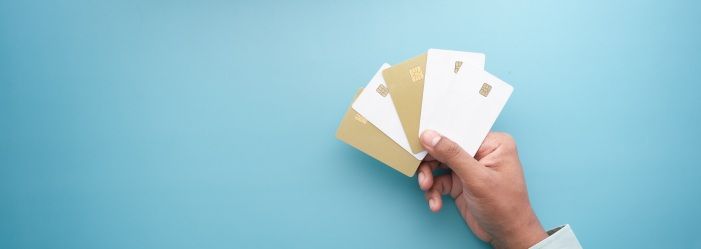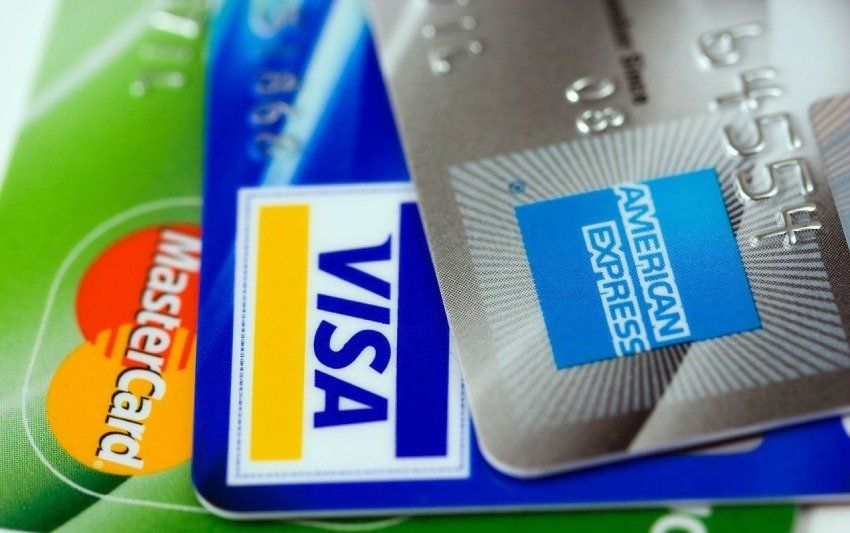Last Updated: March 22, 2024
Find Out How Many Credit Cards You Should Have

Disclaimer: We are not qualified legal or tax professionals and are not giving advice. Always speak with a qualified professional before making any legal or financial decisions.
Deciding on the number of credit cards to hold in your wallet is akin to crafting a personalized financial strategy; there is no universal answer.
While the average American juggles between three and four credit cards, the perfect balance hinges on individual financial goals, management skills, and the pursuit of rewards.
In this guide, we delve into the factors that influence the ideal number of credit cards for you, exploring both the opportunities for maximizing rewards and the risks of overextension.
Join us as we unravel how to find your sweet spot in the world of credit, ensuring that your choices align with your financial health and lifestyle preferences.
Don't want to read through? Speak to a debt specialist right now.
How many credit cards are too many for a person to carry around every day?
Answer: One credit card is probably enough to carry around every day.However, It's often a good idea to carry around one credit card, but make sure you keep the other in a safe place.
The goal of carrying two or more cards is to have an emergency backup in case your first card doesn't work for some reason.
If that happens and you only have one debit card on you, it may be helpful to withdraw $300-$500 cash from the ATM until you can get back home where your bank allows unlimited withdrawals according to federal law (unlike some national banks).
Otherwise, plan ahead so that if credit card #1 does not work at a store today, then use credit card #2 instead for purchases.
The benefits of having more than one credit card are
Now, even though there may be some risk to having too many credit cards, there are some clear benefits you can get because of it.
- Easier to keep track of due dates (when you pay the bill) and also helpful for making payments in different ways like via online, phone banking, or at a branch.
- More points/cash back from spending on various types of cards if you have more than one that earns rewards offered by credit card companies. For example, gas stations often offer extra cash rebates when using certain brands of credit cards but not others. *Extra tip* If your family has multiple members with income sources who earn reward points quickly then consider creating a separate account just for these purchases to maximize your point earnings each month! Just make sure it's easy enough to transfer these funds into your main checking account payday so all expenses are covered.
- No-fee credit cards have some great benefits that are often worth looking into. For example, no foreign transaction fees mean you can save money when traveling to other countries by not having to pay additional fees for using your card in stores or at ATMs abroad. *Extra tip* If you're someone who travels a lot it may be beneficial to look for a rewards credit card with bonus points offered on travel purchases as well! Additionally, most major US airlines offer co-branded airline/credit cards so if you fly regularly this could also help get the savings without transferring funds from checking every time there's an opportunity.
Learn more by reading
What Type of Credit Cards Should I Have
The risks of carrying around multiple credit cards
The risks of carrying around multiple credit cards are mostly convenience.
One obvious risk of carrying around multiple cards is that they can be lost or stolen. In addition, people who frequently carry cards may forget which card they have with them when a purchase is made - this practice also has security implications.
Another big risk of carrying around multiple credit cards is that overspending can lead to a negative balance. This is different from using just one credit card, in this case, the risks are compounded as there's more than one account to consider.
More importantly, though, the real risk arises when you use more money than you have and there's no other viable or quick way to get back into the black again.
So be cautious with your purchases. If you're constantly racking up debt on two of three cards, picking one or the other would be a smart move!
Tips on how to make sure you don't carry too much debt with your different credit cards.
We have compiled some tips below to help you from going into too much debt with different credit cards.
- Pay off your balance in full each month on the earlier credit card.
- Put all your purchases on the later credit card only, and pay that off in full (too) each time you check it from your bank account online (or by using my money chunking app).
- Ensure that you know the interest rates of all of them and which is charging you less money for borrowing their money (i.e., Amex Platinum pays 0% whereas MBNA's Classic Plus has a 10.9% currently).
- Pay more than the minimum payment when possible as this will reduce how many months it will take to pay back this debt; otherwise, if paying just the minimum we recommend reading
What is a good strategy for choosing which card to use when making purchases?
Answer: There are two ways to choose which credit card to use when making purchases. The first is by figuring out if the costs outweigh the benefits of using it. And the second is by comparing rates offered on each card.
The most commonly used metric for determining how cost-effective a credit card transaction might be is in dollars and cents, so if one has a higher interest rate than your spending limit - particularly with no perks - then it may not make sense from that standpoint.
But there are also cards that offer rewards like cash back, whether up-front or deferred or points that can be redeemed for travel flights and hotel stays - great incentives in themselves regardless of interest rates.
Why it's important to think about whether or not you can afford something before actually buying it
Buying something you can't afford is always a bad idea. It will just bring more stress into your life, and if you're not careful, it's going to wreak havoc on your credit score. Besides that, there's no point in buying things you can't afford.
Everybody has to have a certain budget to maintain themselves. It really depends on your income and your preference in terms of wants vs needs. I think the best way to go about this would be to just ask yourself, Throughout any given day, how many times are you going out?
This will give you an idea of how much money you spend on activities and try living within that price range instead. Plus, it might even force us into realizing things we didn't know were true or make us realize that we're buying more stuff than we can afford.
Alternatives to Multiple Credit Cards
If managing multiple credit cards feels overwhelming, discuss options like:
- Using a debit card linked to your checking account
- Using prepaid cards that help limit spending
- Sticking to just one primary credit card
Briefly explain the pros and cons of these alternatives. For example, debit cards directly access your bank account funds so it's easy to track spending. However, they lack some of the benefits and protections of credit cards related to fraud, rewards points and credit building.
Signs You Have Too Much Credit Card Debt
Include a section that outlines warning signs readers may have taken on too much credit card debt:
- Only able to pay minimum monthly payments
- Balances continue to grow each month
- Paying late fees or going over credit limits
- Using cards for essential expenses like groceries
If you notice any of these occurring, it may be time to re-evaluate your credit card debt load. Consider options for consolidating higher interest debts into products with better rates and terms that work for your financial situation.
How many credit cards are too many for a person to carry around every day?
One credit card is probably enough to carry around every day. However, it's often a good idea to carry around one credit card, but make sure you keep the other in a safe place...
Long-Term Impacts of Debt
Explain consequences like:
- High interest costs that accumulate over time
- Lower credit scores that impact ability to borrow
- Calls from collection agencies
- Bankruptcy
Reinforcing why getting debt under control early is critical. The longer balances grow on credit cards with high APRs, the faster interest charges add up. Falling behind on payments leads lenders to turn accounts over to collections which tanks credit. If unmanageable debts persist for years, bankruptcy may feel like the only option which can impact credit for 7-10 years.
FAQs
The Bottom Line
It’s never a good idea to have too many credit cards. However, if you are able to manage your finances well, there is no negative impact on having multiple credit cards.
The key is paying off balances and not carrying debt from one card to another. If you can do this successfully then by all means go for it.
It also depends on the person and their level of risk tolerance, but it's good to have a plan in place for paying off debt when you do decide to take out another card.
Have you considered what your strategy will be if you need more credit than what one card can provide? If not, we're here to help!
*Disclaimer: Pacific Debt Relief explicitly states that it is not a credit repair organization, and its program does not aim to improve individuals' credit scores. The information provided here is intended solely for educational purposes, aiding consumers in making informed decisions regarding credit and debt matters. The content herein does not constitute legal or financial advice. Pacific Debt Relief strongly advises individuals to seek the counsel of qualified professionals before undertaking any legal or financial actions.
✔ Accredited by Better Business Bureau with BBB A+ rating (4.93 rating and 1678 reviews)
✔ US News and World Reports and Bankrate ranked Pacific Debt Relief as one of “The Best Debt Relief Companies of 2024”
✔ 6.9 star rating by BestCompany.com (over 2379 client reviews)
✔ 4.8 star rating by TrustPilot based (over 1613 verified consumer reviews)
✔ ConsumerAffairs.com Accredited (over 544 verified reviews with an average rating of 5 stars)
✔ A Top 10 Rated Compan by TopTenReviews.com , ConsumersAdvocate.com and Top10debtconsolidation.com
✔ 4.6 star rating by Google (229 client reviews)
✔ 100% rating by SuperMoney (9 client reviews)
Reduce Your Credit Card Debt By Up to Half

BBB Reviews | 4.9/5.0 Rating









 Do Not Sell My Personal Information
Do Not Sell My Personal Information